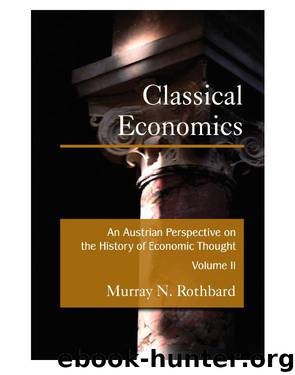Classical Economics by Murray N. Rothbard

Author:Murray N. Rothbard [Rothbard, Murray N.]
Format: epub
Publisher: Ludwig von Mises Institute
Published: 2009-11-16T05:00:00+00:00
the folly, the avarice, the insufferable arrogance, the headlong, desperate, and unprincipled gambling and jobbing, which disgraced nobility and aristocracy, polluted senators and senate houses, contaminated merchants, manufacturers, and traders of all kinds, and threw a chilling blight for a time over honest plod and fair industry.
The bank tried feebly to stem the tide during the first half of 1846, but no sooner did bank reserves increase, than the bank, which had raised its discount rate to 3 1/2 per cent in November 1845, dropped it back to 3 per cent the following August. Bank reserves then resumed their steep decline, falling from £10 million in August 1846, a ratio of specie to notes and bank deposits of 58 per cent, to only £3.0 million in April 1847, a ratio of only 20 per cent.
Again, the bank tried to check the tide it had created and continued to generate, but too little and too late. Interest rates rose with the inflationary boom, so that an increase of the bank discount rate to 4 per cent in January 1847 left the rate still under the market, and between 9 January and 10 April, total bank credits rose by £4.5 million and discounts by £3.8 million.
By April 1847, the Bank of England, as well as the entire financial and economic system, was in deep crisis: it increased its rate to 5 per cent, but market rates were now up to 7 per cent. Rejecting efforts by a minority of bank directors to raise the rate to 7 per cent, or even to 6, the bank made things much worse by keeping its rate at 5 and then rationing credit, suddenly cutting off discounts, calling in loans, and refusing to increase loans regardless of the credit quality of the borrower. The bank's refusal to raise rates and instead discriminate in favour of certain borrowers did not, however, save the commercial bank owned by the bank's own governor, W.R. Robinson, from stopping payments in July, or the bank of two other directors from going under in September.
The bank's sudden contraction, cessation of loans and credit rationing caused a severe business and financial panic in April and May of 1847. This drastic therapy finally eased the bank's own condition by the end of May, with the gold outflow temporarily reversing. By the beginning of July, the bank's reserves had doubled from £3.0 million to £6.0 million, a reserve ratio to deposits of 32 per cent. But no sooner had the pressure eased than the bank began to expand again, in the meanwhile making things worse by keeping its discount rate below the market and indulging in selective credit rationing. In September, the second great crisis of 1847 broke, and mercantile failures spread throughout September and October. Thomas Tooke lamented that ‘These mercantile failures, in number and in the amount of property involved in them, were unprecedented in the commercial history of this country’. In October, the banks began to break, and bank runs began to spread through the provinces.
Download
This site does not store any files on its server. We only index and link to content provided by other sites. Please contact the content providers to delete copyright contents if any and email us, we'll remove relevant links or contents immediately.
International Integration of the Brazilian Economy by Elias C. Grivoyannis(107319)
The Radium Girls by Kate Moore(12009)
Turbulence by E. J. Noyes(8014)
Nudge - Improving Decisions about Health, Wealth, and Happiness by Thaler Sunstein(7687)
The Black Swan by Nassim Nicholas Taleb(7095)
Rich Dad Poor Dad by Robert T. Kiyosaki(6588)
Pioneering Portfolio Management by David F. Swensen(6278)
Man-made Catastrophes and Risk Information Concealment by Dmitry Chernov & Didier Sornette(5993)
Zero to One by Peter Thiel(5778)
Secrecy World by Jake Bernstein(4735)
Millionaire: The Philanderer, Gambler, and Duelist Who Invented Modern Finance by Janet Gleeson(4456)
The Age of Surveillance Capitalism by Shoshana Zuboff(4272)
Skin in the Game by Nassim Nicholas Taleb(4229)
The Money Culture by Michael Lewis(4182)
Bullshit Jobs by David Graeber(4170)
Skin in the Game: Hidden Asymmetries in Daily Life by Nassim Nicholas Taleb(3983)
The Dhandho Investor by Mohnish Pabrai(3747)
The Wisdom of Finance by Mihir Desai(3724)
Blockchain Basics by Daniel Drescher(3571)
